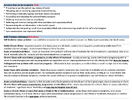its a little more complicated than tha.
ROS has fallen out of favor.
FH is fallen out of favor.
focused PE is appropriate.
your note should show the complexity of the encounter.
you can use these wizards to get some info.
Use the E/M Calculator from the experts at Codify. Check CMS Documentation Guidelines, Time-Based Coding, and get on the fast track to E/M level accuracy.

www.aapc.com
first, you need to document problems addressed, 1 or more than 1, and whether stable or acute and how acute.
second, you need to document the data reviewed, how many, and whether you discussed with others or did an independent determination. included is the tests ordered.
third, you have to discuss risk of treatment, including prescriptions, surgical options, and severity of surgery.
by the book, in milles example, it is AND that gets you a 4. OR will only give 3. in that example what pushes it from a 3 to a 4 is prescription medication ie moderate complexity medical decision making.
2 or more stable illnesses with 1 xray order and no prescription gives a 3.
View attachment 414961
2 or more stable illnesses with 1 xray order including prescription drug management is 4:
View attachment 414962
and this is 2 stable illnesses without new review of imaging or ordering imaging but with prescription drug management:
View attachment 414963
its the
Risk of Complications and/or Morbidity or Mortality of Patient Management that makes the biggest difference.
you can play with the calculator. i put in 2 stable illnesses (same level as 1 chronic illness with exacerbation) with ordering 3 instead of 2 tests (xray, MRI and HgA1C for example) and got a 4 even with no RIsk.
likewise, 2 illnesses, no data reviewed and moderate risk (ie prescription drug management or minor surgery with identified risk factors) gets a 4, so those diabetics getting an epidural is a 4.



